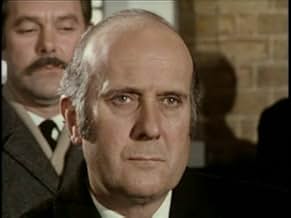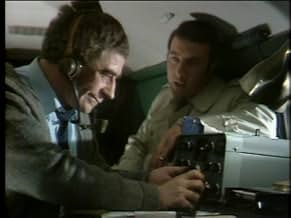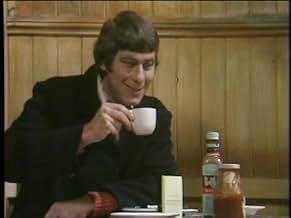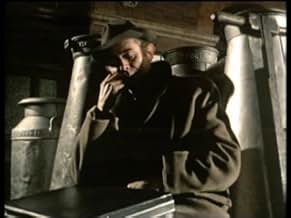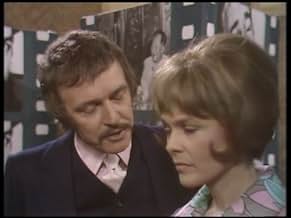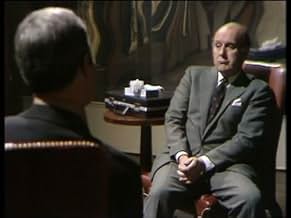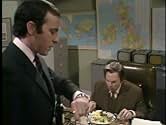David Callan is the security service's main agent/killer.David Callan is the security service's main agent/killer.David Callan is the security service's main agent/killer.
- Won 1 BAFTA Award
- 2 wins & 3 nominations total
Browse episodes
Featured reviews
The other reviews will tell you that this is one of the best TV series ever, much under-appreciated, and worth your time. They are mainly right, with a few exceptions. First the genesis of the series is odd. Callan was originally a successful novel (younger readers, this would be in the days of paper and ink, not portable devices) and a solid action-thriller. The original Callan, as written, did indeed have a conscience but always preferred a quick and reliable solution (guns and bullets) to soul-searching. When the author, Mitchell, was approached to turn the story into a TV series, he did something very unusual. Where other authors will usually blame someone else for interfering with their work, Mitchell re-imagined Callan entirely on his own initiative, turning a man of action into man of conflict. With hindsight it was a brilliant decision. While we may never know what the British public would have thought of Callan as originally conceived (remember that TV violence was very stylized at the time, look at the Avengers, or Batman in the US) they simply fell in love with the re-imagined Callan as a soul-searching and reluctant spy. The show was #1 for several years and ultimately a much pudgier Woodward shuffled off to America to attempt to re-create the Callan persona for US tastes. With mixed success.
Callan was a very dark series which has never been given the credit it deserved. I'm glad to see the series on DVD here in England because it is a series I would recommend to anyone who wasn't born when it first aired.
A pre-Equalizer Edward Woodward played Callan who was an agent for British Intelligence. He was no James Bond however; Callan's was a dark world where everyone had their own agenda and no-one could be trusted. Things were not black and white; there were plenty of shades of grey. Unlike James Bond, Callan didn't have a posh car, plenty of beautiful women and he didn't get to jet off to sunny locations. Callan hated his job, he had no choice but to work for British Intelligence (watch the first episodes to see why that is). He was a good man deep down and cared about people but he was constantly required to lie and deceive people and cheat. He was given the dirty jobs no-one else wanted and whilst his superior (a man called Hunter, played by various actors)knew that Callan was good at his job, he also didn't care about Callan at all. Callan was a loner.
The premise was very interesting indeed. Callan was reluctantly doing a dirty job and his emotions came into conflict with his job at times. It was fascinating viewing.
Over the years there have been many dark series where you can never be sure who is good and who is bad. In a way, I guess it is indicative of the times we are living in. However, I think it is important to remember that Callan was the benchmark for many of the dark and pessimistic shows we see today and without Callan, many of them would not have arisen.
A pre-Equalizer Edward Woodward played Callan who was an agent for British Intelligence. He was no James Bond however; Callan's was a dark world where everyone had their own agenda and no-one could be trusted. Things were not black and white; there were plenty of shades of grey. Unlike James Bond, Callan didn't have a posh car, plenty of beautiful women and he didn't get to jet off to sunny locations. Callan hated his job, he had no choice but to work for British Intelligence (watch the first episodes to see why that is). He was a good man deep down and cared about people but he was constantly required to lie and deceive people and cheat. He was given the dirty jobs no-one else wanted and whilst his superior (a man called Hunter, played by various actors)knew that Callan was good at his job, he also didn't care about Callan at all. Callan was a loner.
The premise was very interesting indeed. Callan was reluctantly doing a dirty job and his emotions came into conflict with his job at times. It was fascinating viewing.
Over the years there have been many dark series where you can never be sure who is good and who is bad. In a way, I guess it is indicative of the times we are living in. However, I think it is important to remember that Callan was the benchmark for many of the dark and pessimistic shows we see today and without Callan, many of them would not have arisen.
Callan was a series I discovered after being laid up with a heavy cold a couple of years back. Taughtly written, gritty, with an extraordinary air of oppression. David Challan worked for a secretive government department with a grim mission...
All I could say I was hooked.
This was espionage for adults, the perfect antidote to the CGI and exaggerated heroics of Bond and Bourne; Edward Woodward's David Callan - an angry, cynical, insubordinate ex- con/ ex- soldier - could have done them a nasty (and a half) without blinking. Prior to Callan, the closest we had to 'real' spies was Alex Le Mass or Harry Palmer...and like them Challan knew he was in a dirty business.
Good turns too from Russell Hunter, William Squire, Liz Langdon and Patrick Mower (staggers me he made Carry On England at this time!). Harold Wilson said he liked the show too... while I admire his tastes - bearing in mind the climate of the Seventies - I have to ask what was going through his head when he watched it?
Highly recommended.
All I could say I was hooked.
This was espionage for adults, the perfect antidote to the CGI and exaggerated heroics of Bond and Bourne; Edward Woodward's David Callan - an angry, cynical, insubordinate ex- con/ ex- soldier - could have done them a nasty (and a half) without blinking. Prior to Callan, the closest we had to 'real' spies was Alex Le Mass or Harry Palmer...and like them Challan knew he was in a dirty business.
Good turns too from Russell Hunter, William Squire, Liz Langdon and Patrick Mower (staggers me he made Carry On England at this time!). Harold Wilson said he liked the show too... while I admire his tastes - bearing in mind the climate of the Seventies - I have to ask what was going through his head when he watched it?
Highly recommended.
"Callan" shall always remain the ultimate Spy drama on British television. Nothing can match the series for character depth, drama, storytelling, tension and suspense. Thankfully, all the existing episodes can be enjoyed once again, thanks to DVD. For the record, 34 episodes exist - including all of the colour ones that ran from 1970 to 1972. The regular cast are a delight. Edward Woodward is the ideal choice to play the main character of a highly skilled but reluctant killer for British Intelligence. The character is someone who has no formal training or qualifications. Killing is the only thing he knows and Callan relies upon that kind of work in order to survive another day. Regarding the character of "Hunter," he is described as being a cold fish who needs to be that way in order to perform his job with efficiency. He is the one who sets up the various jobs for his operatives in "the Section." Where he receives his orders, we never know. There were different actors who played "Hunter." For the first series which was broadcast in 1967, Ronald Radd played the character and is excellent. Then he was unavailable and so Michael Goodliffe replaced him until 1969. He left because he was unhappy with working on the series and wasn't bonding with the cast, apparently. He didn't like appearing in a programme which reminded the actor of his time serving in the Second World War. For the rest of the black and white series, Derek Bond played "Hunter." Anthony Valentine personified evil and sadism as the psychopathic operative Toby Meres. His character was a "public school" background and was from a privileged family. He had no conscience about killing anyone, he enjoyed the act of committing murder. To Meres, he employed whatever means were necessary in order to complete an assignment. He and Callan came to respect each other begrudgingly after a while. Every time Anthony Valentine smiled or applied a bit of charm, you winced slightly because you knew it was a facade which masked what was lurking underneath....... The character of Lonely was brilliantly brought him to life by Scottish actor Russell Hunter. Lonely was someone who helped Callan by providing him with guns, tailing someone, breaking into someone's house. Eventually, he was employed as a taxi driver for "the Section." Lonely was loyal to Callan but mainly because he was terrified of being beaten by him. In a strange way, Callan regarded Lonely as being about the only person he thought of as a friend. Both characters felt like outcasts in society for different reasons. The black and white episodes crackle and are about as taut and realistic as you could get. The sense of continuity is just about maintained, in spite of the missing episodes. The final black and white from series 2, was supposed to mark the end of the series for good. The last scene was meant to show Callan's fate. However, to everyone's considerable surprise, there was a public outcry as "Callan" had become a sensation right across Britain. The viewing figures were enormous and the public wanted more episodes. 1970 saw the series being made and broadcast in colour. It was time to take "Callan" to a new level. Unfortunately, Anthony Valentine was unavailable to reprise his role of Meres. Instead, Patrick Mower was brought in as another character, James Cross. Like Meres, Cross was a hard, sadistic killer who was in love with cruelty for its own sake. He had high hopes of advancing his career as an operative and this included replacing Callan as the number one killer in the section. He was a great character and Patrick Mower played him well but I narrowly prefer Anthony Valentine as Meres. Welsh actor William Squires was cast as the new "Hunter." He was another very effective boss and seemed to treat Callan as a bit more of a human being. A further addition to series 3, was the character of the sections physician - Dr. Snell. He was the kind of person who had such a clinical approach to his work, that it bordered on Nazism. At the beginning of series 3, Callan has to prove once again that he is worthy of being kept in the department. There follows various stories that explore his character further, his relationships with Lonely, with Hunter and very occasionally with the opposite gender. A major feather in the shows cap, was the hiring of George Markstein who acted as Script Editor. All kinds of stories have circulated about Markstein have surfaced. These include his having worked for British Intelligence. He was thought to have had an air of menace about him. Even so, he was an asset to the series. Series 4 brought a bit of a twist to the tale, in that Callan was promoted to "Hunter." Geoffrey Chater was brilliant as the rather shadowy civil servant who gave the orders usually, usually via "Hunter." The production values were rather modest, although they had improved slightly during the colour episodes. The beauty of "Callan" lays in its writing and acting. The two components go hand in hand. The violence is rather tame in comparison with these days but the violence in "Callan" has a purpose, it isn't just thrown in for the sake of it. For television of the times, it was quite a realistic kind of violence. Most of the time though, it was implied and that was enough. We see many talented actors in the supporting cast, including Tony Beckley, Dennis Price, Windsor Davies, Graham Crowden, Sarah Lawson amongst others. Watching a masterpiece of a series like "Callan," makes me realise what a deplorable state modern television is in.
10Owlnz
I think I managed to see the entire series bar a couple of episodes and the story lines were always excellent. Great casting throughout. Alas, I realize how old I have become now when I see how Anthony Valentine has aged - have just watched a 2005 episode of the BBCs "New Tricks" this evening, in which he featured. Sadly don't seem to have seen Edward Woodward in many productions during the years since "Callan".
I only ever saw the "Callan" episodes in black and white - colour TV didn't reach New Zealand until several years after it was available in the USA and Europe, and we couldn't afford a colour set until 1982 - but I wonder whether viewing it in black and white added more gritty realism to the plots, and perhaps if I watched it now remastered in colour, would I find it slightly disappointing? I haven't noticed it around on DVD but if I do, don't think I'll be tempted to buy, as I prefer to remember it still with great enjoyment.
I only ever saw the "Callan" episodes in black and white - colour TV didn't reach New Zealand until several years after it was available in the USA and Europe, and we couldn't afford a colour set until 1982 - but I wonder whether viewing it in black and white added more gritty realism to the plots, and perhaps if I watched it now remastered in colour, would I find it slightly disappointing? I haven't noticed it around on DVD but if I do, don't think I'll be tempted to buy, as I prefer to remember it still with great enjoyment.
Did you know
- TriviaThere are 11 episodes, from the first two series, for which there are no known copies in existence, although full unedited studio recordings do exist for The Worst Soldier I Ever Saw (1969) and an off-air soundtrack for Once a Big Man, Always a Big Man (1969) was recovered in 2019.
- ConnectionsFollowed by Callan (1974)
- How many seasons does Callan have?Powered by Alexa
Details
- Runtime1 hour
- Sound mix
- Aspect ratio
- 1.33 : 1
Contribute to this page
Suggest an edit or add missing content



